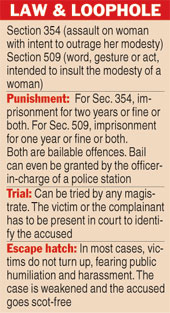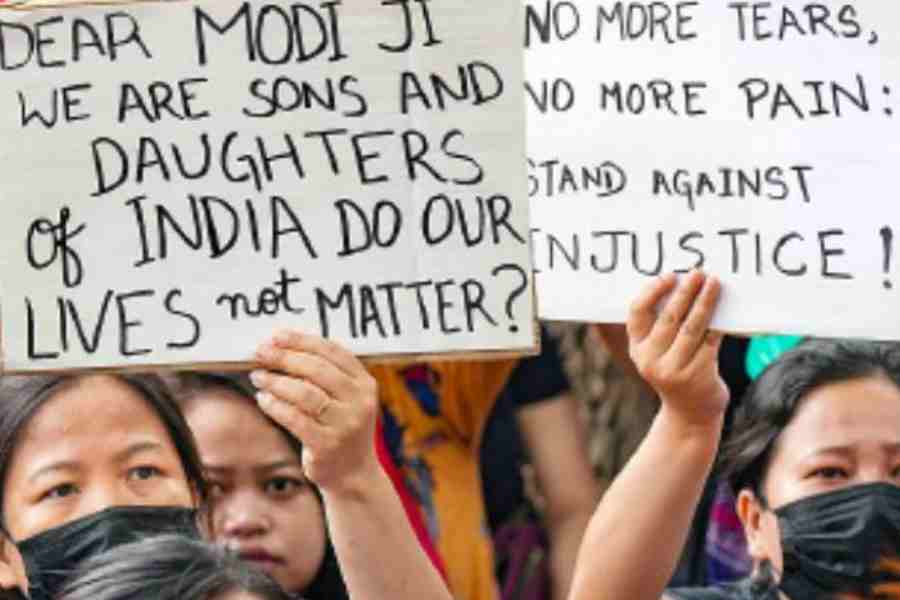 |
| SUSPENDED ANIMATION: The police cooked the goose of investigation early |
Be as high as one ever may, the law is surely above him. But what happens if the seeker of justice is half-hearted in his seeking? The fact is that the state governments, whose duty is to prosecute criminals, are inclined to look the other way if the accused has links with the ruling party of the day.
The state’s role as the reluctant prosecutor has recently put the judiciary across the country in a helpless situation. In West Bengal, a sub-divisional court in West Midnapore district ordered the CBI on January 30 to confiscate property belonging to 12 fugitives who had allegedly murdered a group of political workers belonging to their rival party. All the accused belong to the ruling CPI(M), and the incident took place in January 2001, shortly before the assembly elections. The accused, some of whom even hold offices in the CPI(M), have managed to stay away from the CBI reportedly with the connivance of the police administration. Protocol demands that the CBI keep the state police posted on arrests within the latter’s jurisdiction. But, in this instance, there has been strong suspicion of leaks of arrest moves by the CBI. The doubt is doubly confirmed by the history of the investigation. The police had claimed, after two months of investigation, that they’d found no trace of murder, not even the bodies of the victims missing since then. The case was handed over to the CBI at the orders of the Calcutta High Court.
In 2002, the CBI investigators managed to nab one of the 14 accused, but local villagers — read, CPI(M) activists — attacked the investigators and got their comrade freed. Earlier, while ordering handing over of the case from the state CID to the central CBI, a division bench of the Calcutta High Court had issued strictures against the state police for failure in investigation. It is clear from the hesitant investigation by the police, and its alleged attempts to help the accused avoid arrest by CBI, that the ruling party of the state had exercised its authority on the police to scuttle the investigation. And now one of the ‘fugitives’, who heads a local committee of the party, has been issuing political statements saying that the CBI was playing a “political game” at the instigation of Union home minister L.K.Advani.
The Best Bakery case in Baroda is obviously the epitome of prosecution torpedoed by the prosecutor. The debate over it started in June last year when a fast track court in Baroda acquitted 21 people accused of rioting and murder of 14 inmates and employees of a minority-owned bakery. But Zaheera Sheikh, the key witness, later alleged that she’d turned hostile due to intimidation by members of the ruling party. Last month, ’affaire Zaheera took a new turn as the Supreme Court admitted an appeal against the order of the Gujarat High Court dismissing petition for a re-trial. The high court had not only upheld the lower court’s acquittal order. It upbraided the NGOs who were defending the demand for a retrial, rejected the view that Zaheera had turned hostile because she’d been threatened, and hinted that she might be playing into “the dirty hands of anti-national elements”. If the high court order preventing retrial is reversed by the apex court, it’ll confirm the general charge that, in Gujarat under chief minister Narendra Modi, the riot trials are nothing but a sham. The parties in power in West Bengal and Gujarat, the CPI(M) and the BJP, are ideologically poles apart. They accuse each other of having little respect for the rule of law. But, as the Best Bakery case and the Midnapore murders demonstrate, they are equally prone to disregard the dividing the state and the ruling party and would do their best to stall a trial if it doesn’t suit them.
It will be incorrect to assume that the readiness of politicians to stamp out inconvenient investigations is a recent development, the rule of law having supposedly been held high by state governments in the past. The bane of selective investigation came to light recently when a special court in Jaipur acquitted all the 11 accused in the Deorala sati case 16 years ago. In 1986, when Roop Kanwar, a 16-year-old widow had allegedly been driven by religious zealots to self-immolation after the death of her husband, the incident not only grabbed newspaper headlines for months. It caused the framing of a new-look Prevention of Sati Act, after the famous ‘suttee’ abolition law included in the statutes in 1829 by Lord Bentinck with the help of Raja Rammohun Roy.
However, it helped little in punishing the offenders in the Roop Kanwar case. Among those who have now been acquitted is a vice-president of the state BJP who served as a cabinet minister in the government of Bhairon Singh Shekhawat. Rajasthan was a traditional Congress bastion that turned saffron in the last decade, with the Roop Kanwar episode being a major flashpoint for the BJP to consolidate the forces of religious obscurantism against state intervention. Interestingly, special judge Shiv Singh Chauhan, who ordered the acquittals, wrote that “the chargesheet against the accused does not mention the Deorala incident and the prosecution failed to produce any evidence that any woman committed sati there (at Deorala)”. Ironically, the Congress was in power in the state when the chargesheet was framed. It’s possible that the issue was too sensitive for the state government to actually punish the guilty, and not just go through the motions, even though the national leadership was ready to pass a new anti-sati law and thus occupy the high moral ground.
In all these cases, it is obvious that the police cooked the goose of investigation at an early stage and framed the charges in a manner that the court couldn’t but throw them out. In all the three cases, though the avowed intention of the prosecution was to secure conviction of the accused, its hidden agenda must have been to get acquittal.










